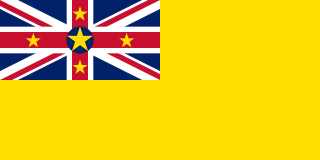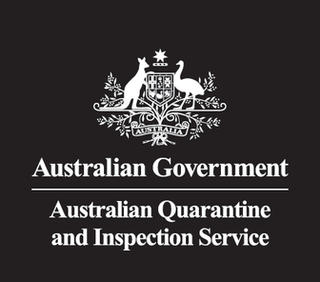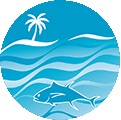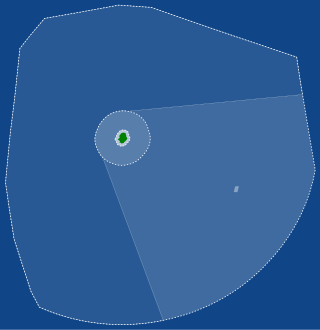Related Research Articles

Niue is a self-governing island country in free association with New Zealand. It is situated in the South Pacific Ocean and is part of Polynesia, and predominantly inhabited by Polynesians. The island is commonly referred to as "The Rock", which comes from the traditional name "Rock of Polynesia".

An exclusive economic zone (EEZ), as prescribed by the 1982 United Nations Convention on the Law of the Sea, is an area of the sea in which a sovereign state has exclusive rights regarding the exploration and use of marine resources, including energy production from water and wind. EEZ does not define the ownership of any maritime features within the EEZ.

The Australian Quarantine and Inspection Service was the Australian government agency responsible for enforcing Australian quarantine laws, as part of the Department of Agriculture.

Agriculture, forestry, and fishing form the primary sector of industry of the Japanese economy together with the Japanese mining industry, but together they account for only 1.3% of gross national product. Only 20% of Japan's land is suitable for cultivation, and the agricultural economy is highly subsidized.

Fishing in India is a major sector within the economy of India contributing 1.07% of its total GDP. The fishing sector in India supports the livelihood of over 28 million people in the country, especially within the marginalized and vulnerable communities. India is the third largest fish producing country in the world accounting for 7.96% of the global production and second largest producer of fish through aquaculture, after China. The total fish production during the FY 2020-21 is estimated at 14.73 million metric tonnes. According to the National Fisheries Development Board the Fisheries Industry generates an export earnings of Rs 334.41 billion. Centrally sponsored schemes will increase exports by Rs 1 lakh crore in FY25. 65,000 fishermen have been trained under these schemes from 2017 to 2020. Freshwater fishing consists of 55% of total fish production.
This page is a list of fishing topics.

Until the 1960s, agriculture and fishing were the dominant industries of the economy of South Korea. The fishing industry of South Korea depends on the existing bodies of water that are shared between South Korea, China and Japan. Its coastline lies adjacent to the Yellow Sea, the East China Sea and the East Sea, and enables access to marine life such as fish and crustaceans.

As with other countries, New Zealand's 200 nautical miles exclusive economic zone gives its fishing industry special fishing rights. It covers 4.1 million square kilometres. This is the sixth largest zone in the world, and is fourteen times the land area of New Zealand.

The coastline of the Russian Federation is the fourth longest in the world after the coastlines of Canada, Greenland, and Indonesia. The Russian fishing industry has an exclusive economic zone (EEZ) of 7.6 million km2 including access to twelve seas in three oceans, together with the landlocked Caspian Sea and more than two million rivers.
The Australian Fisheries Management Authority (AFMA) is the Australian Government agency responsible for the management and sustainable use of fisheries resources including combating illegal fishing activities in the Australian Fishing Zone that covers 8,148,250 square kilometres, the third largest in the world, and in most of Australia's Exclusive Economic Zone, which extends to 200 nautical miles (370 km) from the coastline of Australia and its external territories, except where a maritime delimitation agreement exists with a state. AFMA is an agency of the Australian Department of Agriculture, Fisheries and Forestry. The Authority does not have a legal identity separate from the Commonwealth.

The Ministry of Fisheries, also known by its acronym MFish, was a state sector organisation of New Zealand whose role is ensuring the sustainable utilisation of fisheries. It was merged into the Ministry of Primary Industries in April 2012. Its purpose was conserving, using, enhancing and developing New Zealand's fisheries resources.

The Pacific Islands Forum Fisheries Agency (FFA) is an intergovernmental agency established in 1979 to facilitate regional co-operation and co-ordination on fisheries policies between its member states in order to achieve conservation and optimum utilisation of living marine resources, in particular highly migratory fish stocks, for the benefit of the peoples of the region, in particular the developing countries. The office campus is located in Honiara, Solomon Islands
The Ministry for Primary Industries is the public service department of New Zealand charged with overseeing, managing and regulating the farming, fishing, food, animal welfare, biosecurity, and forestry sectors of New Zealand's primary industries.

Fishing is important to the national economy of Vanuatu. It is the main source of income for many in the islands and Vanuatu's biggest export. According to 2009 figures, approximately 77% of households in Vanuatu are involved in fishing activity. According to 2005 figures, Vanuatu caught 151,080 fish in that year, with frozen fish accounted for half of Vanuatu's commodity exports.

The Department of Agriculture, Fisheries and Forestry (DAFF) was an Australian government department that existed between 1998 and 2013, when it was renamed as the Department of Agriculture. DAFF's role was to develop and implement policies and programs that ensure Australia's agricultural, fisheries, food and forestry industries remained competitive, profitable and sustainable.

The Ministry for the Ecological Transition and the Demographic Challenge (MITECO) is the department of the Government of Spain responsible for developing the government policy on fight against climate change, prevention of pollution, protecting the natural heritage, biodiversity, forests, sea, water and energy for a more ecological and productive social model. Likewise, it is responsible for the elaboration and development of the government policy against the country's demographic challenges.

Japan has the eighth-largest exclusive economic zone (EEZ) in the world. The total area of Japan is about 380 thousand km2. Japan's EEZ area is vast and the territorial waters and EEZ together is about 4.47 million km2.
Illegal, unreported and unregulated fishing (IUU) in the Arctic is an under researched scientific field. The most recent academic articles about IUU in the Arctic mainly concerns the mid-2000s.
The Australian Department of Agriculture, Water and the Environment (DAWE) was an Australian Government department which operated from 1 February 2020 until 30 June 2022. It represented Australia's national interests in agriculture, water and the environment.

The Niue Nukutuluea Multiple-Use Marine Park is a marine protected area that encompasses the territorial waters and exclusive economic zone surrounding the Pacific island of Niue, covering a total area of 318,140 square kilometres (122,830 sq mi). Established in April 2022, it incorporated the Niue Moana Mahu Marine Protected Area and Beveridge Reef Nukutulueatama Special Management Area, which had been established in April 2020.
References
- 1 2 "Ministries". Government of Niue. Retrieved November 11, 2018.
- 1 2 "The Department of Agriculture, Forestry and Fisheries of Niue (DAFF)". Te Vaka Moana. Retrieved October 31, 2018.
- ↑ "New Zealand and Niue officials join forces to help save the uga crab population". New Zealand Government. Ministry for Primary Industries. December 21, 2015. Retrieved October 31, 2018.